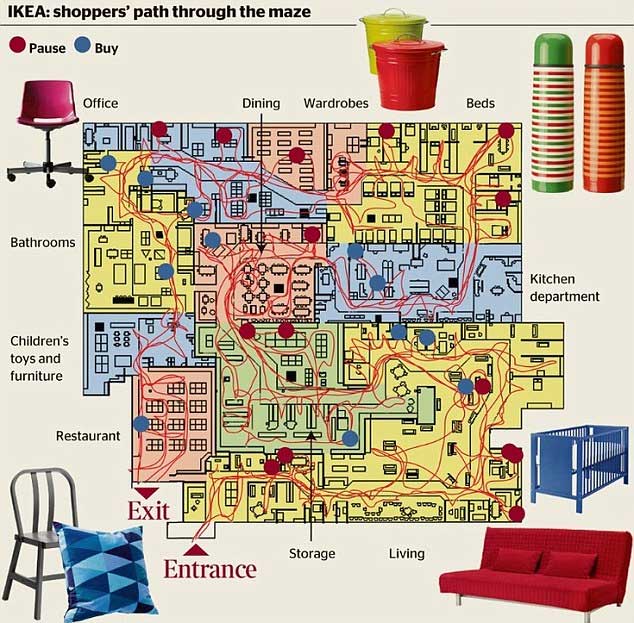It’s that time of the year when Indians shop and splurge. If you are planning to do a lot of shopping this Navratra – Durga Puja – Diwali season, watch out for these retailer tricks that are aimed to make you spend more than you had planned to.
 1. Dynamic Online Pricing:
1. Dynamic Online Pricing:
While the advantages of online shopping are many, it also comes with a few possible disadvantages peculiar to the online platform. Sites are now able to track user behaviour, time spent etc in a detailed way.
So if you hang around long enough on a site, you might be offered a higher price compared to another guy who has just logged in.
Airline and hotel sites in the US are known to offer different prices depending on the location of the user. A woman in New York may be offered a higher price compared to one from the hinterland.
One way to avoid this, and similar other online tricks, is to browse and shop in the incognito tab.
 2. Ice Breakers
2. Ice Breakers
You enter a store just to check out a few things. But the first thing you notice is a small ticket item, say a pair of socks, and that too with a 50% discount. It’s a good deal and you pick it up.
The store has now broken your initial shackles. Your probability of now purchasing more items from the same store just increased!!!
 3. Asymmetric Dominance Effect:
3. Asymmetric Dominance Effect:
Supposing there were only 2 size options in a perfume brand:
| Option 1 | Option 2 |
| 50 ml | 100 ml |
| Rs.1000 | Rs.1600 |

In this case, some of us will choose Option 1 while others will choose Option 2 depending on whether we are looking for a bigger size or for a lower priced variant.
Now say, the company introduces another variant
| Option 1 | Option 2 | Option 3 |
| 50 ml | 100 ml | 75 ml |
| Rs.1000 | Rs.1600 | Rs.1500 |

Voila! That changes things for a lot of customers. Now you are being told that you get 25 ml for just an extra Rs.100. (Note, you are no longer comparing the price to Rs.1000 but to the Rs.1500 one now, and that changes everything)
 4. The kind offer of the shopping bag / cart at the entrance:
4. The kind offer of the shopping bag / cart at the entrance:
It is much easier to pick a product from the shelf and put it into the cart than carry it around in your hands, especially if you are already carrying an item in your hand.
Say NO to the helpful doorman when he offers you the cart just as you enter the store. Look around first, and if you genuinely feel like picking up multiple items, go take the cart.

 5. Tidbits at the Cash Counter
5. Tidbits at the Cash Counter
Remember the chocolates, pens, socks etc. carelessly placed around the cash counter? There is nothing careless about them at all.
Having already spent a tidy sum, your brain now processes a low ticket item very favourably now. What is another 200 bucks when the bill is already over five grands?
 6. Bhul Bhulaiya Malls & Stores
6. Bhul Bhulaiya Malls & Stores
If you stay in or around Delhi, you must have visited the new DLF Mall of India in Noida. It is designed in an asymmetric format. The idea is that you don’t easily get used to the mall plan, thus ensuring that you spend more time window shopping, and hopefully some of that will convert into sales.
Look at this floor plan of an IKEA store in the image below. The objective of the floor plan designer is to ensure that shoppers end up taking a convoluted, long walking route through the store – this will ensure that she looks at the maximum possible items, thus maximizing the potential of her picking up something (which she hadn’t planned to).
![]() “Maximize her window shopping” – that is the mantra.
“Maximize her window shopping” – that is the mantra.

Image Source: DailyMail
 7. Currency Denomination Effect:
7. Currency Denomination Effect:
It doesn’t need rocket science to figure out that a person is more likely to part with a hundred rupee note than a five hundred one. This is what leads a lot of brands to launch a lot of tiny sized products. Don’t pick up an item from the store simply because it is priced low.
Before you grab a low priced item, ask yourself: Do I really need it?
 8. What you See is What you Buy
8. What you See is What you Buy
Stores will tend to arrange high-margin items on the shelfs at the eye level – typically at the 5 to 5 and a half-feet level in India. We are lazy bums and don’t make much of an effort to look for the most optimal products.

So next time you go shopping, stay alert and don’t be shy of bending your back to pick up those better priced products stacked on the lower shelves.
There is an entire field of retail science study behind this. If you are keen on further details, check out this link on the Eyequant Blog.
 Image Source: CBS News
Image Source: CBS News
 9. Discounts which are not really discounts
9. Discounts which are not really discounts
Keep an eye for brands that are selling at a discount round the year. Their ‘original price’ is crap, meaningless. If you remain even slightly alert, you will immediately begin noticing that some brands seem to have their ‘Buy 1, Get 2 Free’ sale round the year!!
 10. 6 Pack Abs are Good, 6 Pack Buys are Not
10. 6 Pack Abs are Good, 6 Pack Buys are Not
“Get 1 for Rs.50, Get a pack of 6 for Rs.200”
If you just want one, don’t fall for the six-pack-trap! It will hurt you not just in the short term, but also in the longer run. Not only is this a retail tactic to make you spend more immediately, but also to increase your consumption habits in the longer run.

 11. Free Samples
11. Free Samples
While most sampling offers are a genuine effort by brands to create awareness about a new product or to aid with some market research, sometimes sample stations are a way to bring you in. Once you are in, chances are you will look around and buy some of the other stuff. Not everything is free!
 12. Convenience is costlier
12. Convenience is costlier
It is definitely easier to pick up a bag of pre-packed onions than make the effort to pick up the best ones. But the bag likely doesn’t contain all the best onions. 😥

 13. Downloaded Apps / Push Notifications
13. Downloaded Apps / Push Notifications
You are more likely to buy something off an app already sitting on your smartphone rather than make an effort to find the best website.
Also, apps and increasingly websites now keep harassing you with pop-ups till you agree to receive notifications. And you are likely to click on these pushed notifications every now and then.
 14. Airline / Hotels Few Seats Left Ploy
14. Airline / Hotels Few Seats Left Ploy
Not that they are lying to you, but when you are consciously made aware of the fact that there are only 2 seats left, you are more likely to complete the purchase soon. So, be careful and don’t let the retailers hit your panic button so easily.

 15. Try it out. It costs nothing.
15. Try it out. It costs nothing.
True; trying it out costs nothing. But chances are that you are a nice human being, with a suitable ‘sense of guilt’ to go with. Once you end up trying out a few different clothes, your sense of guilt will nudge you into buying at least one piece. So think before you try it out!
 16. Online Cash Back Schemes
16. Online Cash Back Schemes
This one is a trap – the never ending cycle trap. You buy something for Rs.2500, your wallet gets credited with a cashback of 10%.
You are happy that your wallet now has Rs.250.
Next time you shop online, you are now likely to first checkout this app or site because you obviously you want to use this ‘free’ Rs.250 lying in your wallet.
So far, so bad. What’s worse is when you decide to shop to utilize this 250 bucks which will otherwise go waste 🙁
The trap has just opened its mouth.
BEWARE.

Leave a Reply